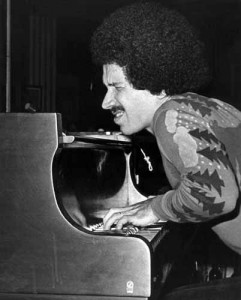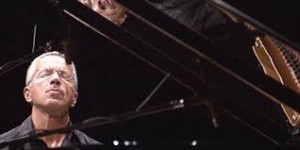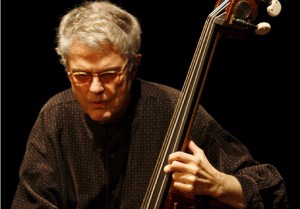Intiem en geraffineerd
Volgende week komt de CD Last Dance uit. Keith Jarrett (piano) en Charlie Haden (bas) spelen
traditionals uit het American songbook. Subtiel en geraffineerd gespeeld, zoals deze twee veteranen dat vroeger konden en nu weer doen. Het album bevat het 2e deel van opnames die werden gemaakt in de home studio van Jarrett in 2007. In 2010 werd Jasmine uitgebracht, en nu Last Dance.
33 jaar nadat Keith Jarrett’s bekende ‘American quartet’ uit elkaar ging, kwamen Jarrett en Haden weer bij elkaar voor deze opnames.
“Als wij samen spelen, is het alsof twee mensen gaan zingen”, zei Jarrett over de reünie met Haden.
“ De bedoeling van de stukken blijft intakt, de betekenis van een melodie en een tekst worden instrumentaal onderzocht”. Haden zei: “ Keith luistert, en ik luister. Dat is het geheim. Het gaat over luisteren”. Ze spelen de stukken intiem, spontaan en warm.
Haden zat, met drummer Paul Motian en later saxofonist Dewey Redman, in Keith Jarrett’s ‘American quartet’. Ornette Coleman – met wie Haden ook veel gespeeld had – noemde Haden “ de bassist die de muziek speelt, niet de achtergrond”, daarmee aangevend dat Haden muzikaal gesproken niet in een rijtje ‘dienstbare bassisten’ paste. Jarrett speelde zowel traditioneel als heel vrij.
Keith Jarrett over the Art of Improvisation (deel 1 van 4)
Jarrett speelde in de jaren 60 in het kwartet van Charles Lloyd en later bij Miles Davis in zijn fusionperiode. Jarrett haatte (en haat) elektrische instrumenten maar aanvaardde de job uit ontzag voor Davis. Jarrett bleef maar 1 jaar (’69-’70) bij Davis om vervolgens een eigen trio te beginnen met Charlie Haden (bass) en Paul Motian (drums). Later werd dit trio aangevuld met saxofonist Dewey Redman. Midden tot eind jaren zeventig leidde Jarrett ook een Europees kwartet met Jan Garbarek (sax), Palle Danielsson (bass) en Jon Christensen (drums).
Het bekendst is Jarrett echter om zijn gigantische solo-œuvre. Vanaf 1971 ontwikkelde hij zich door zijn live-improvisaties tot een waar fenomeen om te zien. Hij veranderde het hele solo piano concept door concerten te geven waarbij hij veertig minuten lange improvisaties uitspon.
Hij werd eind jaren 90 een paar jaar geveld door een chronisch vermoeidheidssyndroom; ging weer spelen vanaf 2002. Vanaf dat moment speelde hij in zijn soloconcerten alleen nog maar korte(re )stukken. Overigens nam hij gedurende zijn lange carrière ook meerder platen op met klassieke muziek.
laatste solo concert Tokyo 1987
toegift van dat concert
Charlie Haden is onder andere bekend van zijn langdurige samenwerking met saxofonist Ornette Coleman (vanaf de late jaren 50). Hij staat bekend om zijn zingende baspartijen. Hij nam de leiding over het Liberation Music Orchestra in de jaren ’70. Grotendeels gearrangeerd door Carla Bley, was hun muziek zeer experimenteel, omdat ze de gebieden van de vrije jazz en politieke muziek tegelijkertijd verkenden.
Thematische verkenning van genres die normaal niet als standaardjazz worden gezien, werd één van de kenmerkende methodes van het Charlie Haden Quartet West (met oa Ernie Watts op saxofoon). Hij speelde nog met vele anderen, wo Pat Metheney, Kenny Barron.
Liberation Orchestra
ENGLISH VERSION
Keith Jarrett/Charlie Haden: Intimate and refined
This week the CD Last Dance is being released. Keith Jarrett (piano) en Charlie Haden (bas) play traditionals from the American songbook. Played subtle and refined as the two veterans used to do and do again. The album includes the 2nd part of recordings that were made in the home studio of Jarrett in 2007. Jasmine was released in 2010, and now Last Dance.
33 years after Keith Jarrett’s famous ‘American quartet’ disbanded, Jarrett and Haden came together again for this recording.
“When we play together it’s like two people singing”, said Jarrett of his reunion with Haden. “The intentions of the song are honoured, the shades of meaning in a melody or a lyric explored instrumentally. As Charlie Haden put it, “Keith really listens, and I listen. That’s the secret. It’s about listening.” They both play the music in an intimate way, spontaneous and warm.


Keith Jarrett young and old.
Keith Jarrett and Charlie Haden have made exceptional music together in a wide range of contexts. Haden was, with the late Paul Motian, a member of Jarrett’s first great trio. Haden was the bassist of whom Ornette Coleman famously said “he plays the music, not the background”. Jarrett could go anywhere – from melodic free playing to original compositions to forays into the American songbook. Saxophonist Dewey Redman was added to the group, completing what has come to be regarded as one of the most influential bands of the era, Jarrett’s ‘American Quartet’ –in the 70-ies.
Jarrett played in the ’60s in the quartet of Charles Lloyd and later with Miles Davis in his fusion period. Jarrett hated (and hates) electric instruments but accepted the job in awe of Davis. Jarrett remained but one year (’69 – ’70) in Davis’s band and then started his own trio with Charlie Haden and Paul Motian. Later this trio saxophonist Dewey Redman joined the group. Mid to late seventies Jarrett also led an European quartet with Jan Garbarek (sax) , Palle Danielsson (bass) and Jon Christensen (drums).
This week the CD Last Dance is being released. Keith Jarrett (piano) en Charlie Haden (bas) play traditionals from the American songbook. Played subtle and refined as the two veterans used to do and do again. The album includes the 2nd part of recordings that were made in the home studio of Jarrett in 2007. Jasmine was released in 2010, and now Last Dance.
33 years after Keith Jarrett’s famous ‘American quartet’ disbanded, Jarrett and Haden came together again for this recording.
“When we play together it’s like two people singing”, said Jarrett of his reunion with Haden. “The intentions of the song are honoured, the shades of meaning in a melody or a lyric explored instrumentally. As Charlie Haden put it, “Keith really listens, and I listen. That’s the secret. It’s about listening.” They both play the music in an intimate way, spontaneous and warm.
Keith Jarrett and Charlie Haden have made exceptional music together in a wide range of contexts. Haden was, with the late Paul Motian, a member of Jarrett’s first great trio. Haden was the bassist of whom Ornette Coleman famously said “he plays the music, not the background”. Jarrett could go anywhere – from melodic free playing to original compositions to forays into the American songbook. Saxophonist Dewey Redman was added to the group, completing what has come to be regarded as one of the most influential bands of the era, Jarrett’s ‘American Quartet’ –in the 70-ies.
Jarrett played in the ’60s in the quartet of Charles Lloyd and later with Miles Davis in his fusion period. Jarrett hated (and hates) electric instruments but accepted the job in awe of Davis. Jarrett remained but one year (’69 – ’70) in Davis’s band and then started his own trio with Charlie Haden and Paul Motian. Later this trio saxophonist Dewey Redman joined the group. Mid to late seventies Jarrett also led an European quartet with Jan Garbarek (sax) , Palle Danielsson (bass) and Jon Christensen (drums).
However, Jarrett is mostly famous for his gigantic solo oeuvre. From 1971on he developed his live improvisations to a very special phenomenon to see. He changed the whole concept of solo piano by giving long improvisations concerts (like forty minutes on end ).
In the late 90s he was felled by chronic fatigue syndrome ; started playing again in 2002. From that time he only played in his solo concerts short (er) pieces .
Incidentally, during his long career he also made several recordings with classical music.
 Charlie Haden is known for his long cooperation with saxophonist Ornette Coleman (late 50s). He is known for his ‘singing bass’. He took over the Liberation Music Orchestra in the 70s. Largely arranged by Carla Bley, their music was very experimental, as they explored the realms of free jazz and political music at the same time.
Charlie Haden is known for his long cooperation with saxophonist Ornette Coleman (late 50s). He is known for his ‘singing bass’. He took over the Liberation Music Orchestra in the 70s. Largely arranged by Carla Bley, their music was very experimental, as they explored the realms of free jazz and political music at the same time.
Thematic exploration of genres that are not normally seen as a standard jazz became one of the diagnostic methods of the Charlie Haden Quartet West (with Ernie Watts on saxophone). He played with many others, ao Pat Metheney, Kenny Barron.